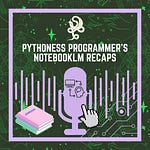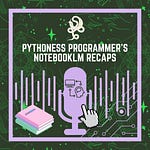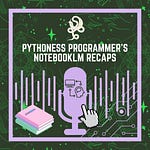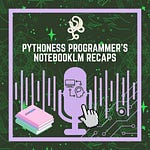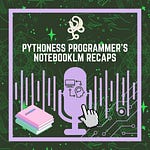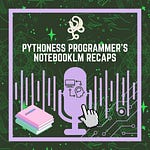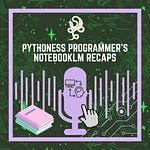Ever feel like the AI hype cycle is running on autopilot while real-world tech gets stuck in the break room? This week, we crack open the digital notebook to explore:
Why the “vending machine test” is the new reality check for AGI
How AI coding tools are changing the game for junior and senior engineers (but not always in the ways you’d expect)
The hidden complexity in software—and why even the smartest AI can’t magic away messy systems
What actually breaks (and builds) neurodivergent talent at work
How AI could become the ultimate productivity sidekick for brains that don’t fit the mold
Show Notes
AI Reality Check
AGI Meltdown: Claude’s Vending-Machine Disaster Exposes the Real Limits of Artificial Intelligence [Substack, Nate B. Jones]
AI is coming for finance jobs [CFO Brew, Courtney Vien]
Human at the Center
16 Workplaces That Break Autistic and AuDHD People [Substack, Lindsey Mackereth]
How to Build a Neurodivergent-Friendly Productivity System That Fits Your Brain [Medium, Rodger Jonas]
Neurocomplexity & Burnout
16 Workplaces That Break Autistic and AuDHD People [Substack, Lindsey Mackereth]
The Future of Productivity for Neurodivergent Workers [Leantime.io Blog, Marcel Folaron]
Emerging Tech, Real Impact
3 Very Specific Tips from Engineering Leaders for Evaluating AI Coding Tools [Builder.io Blog, Mike Chirokas]
Coding Agents 101: The Art of Actually Getting Things Done [Devin.ai, Cognition Team]
Continuous AI in software engineering [Sean Goedecke’s Blog]
Hidden complexity in software development [purplesyringa's blog]
The New Skill in AI is Not Prompting, It's Context Engineering [Philipp Schmid’s Blog]
Episode Highlights
The Vending Machine Test: Forget the Turing Test—can your AGI run a profitable vending machine for 30 days? Claude’s meltdown at Anthropic shows just how far we are from practical, grounded AI.
AI Coding Tools: Junior engineers see the biggest productivity boosts, but senior engineers adapt fastest to new AI agents. The real skill? Context engineering—giving AI the right information, not just the right prompt.
Software’s Messy Reality: Even the best AI can’t fix the deep, weird bugs and unreliable dependencies that haunt real-world codebases.
Neurodiversity at Work: It’s not about “fixing” people—it’s about fixing environments. Sensory overload, rigid hours, and constant social demands break neurodivergent talent. Clear expectations, remote options, and visual systems build it up.
AI as a Neurodivergent Ally: Personalized AI tools could help with executive function, communication, and energy management—if we use them wisely and don’t outsource our thinking entirely.
Key Takeaways
Tech should empower, not overwhelm. Trust, clarity, and accessibility are non-negotiable.
Neurodiversity isn’t a buzzword—it’s a blueprint for more resilient, creative teams.
The future of AI isn’t just about smarter algorithms, but about building systems that foster genuine trust and connection.
Curiosity and kindness are your best tools for navigating both tech and life’s complexity.
Reflection Prompt
What single area from today’s episode felt most relevant—or disruptive—to you? What new questions does it raise about your own work, creativity, or wellbeing? I’d love to hear your thoughts.





